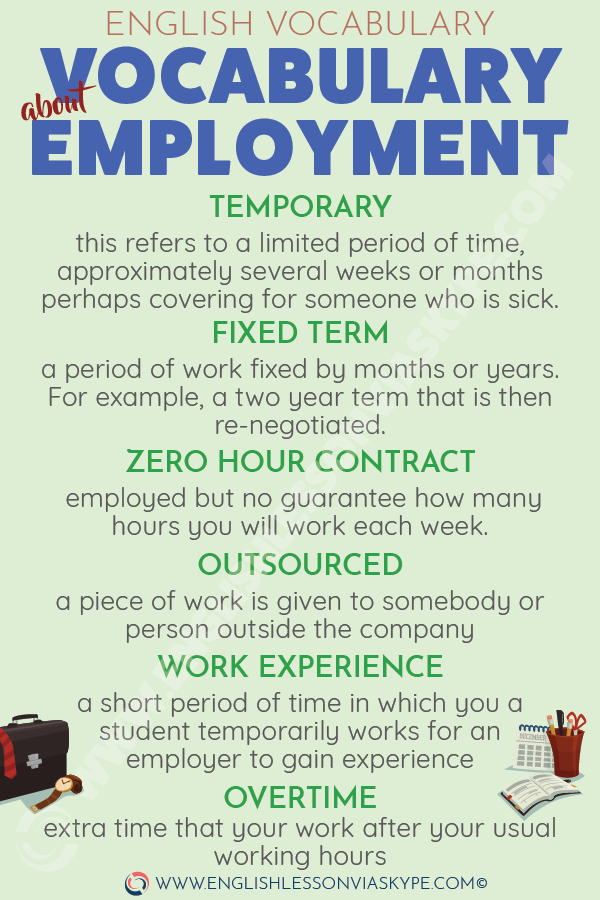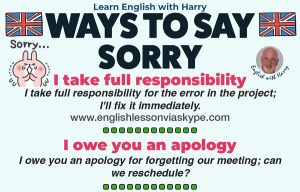For many months now I have been reading articles about the so-called Gig economy and jobs without really knowing to what these articles were referring. If you are currently in the job market looking to change your job or in the process going through a job interview in an English speaking company this English vocabulary about employment might help you.

The Gig economy concerns those jobs today in the internet age that are neither permanent nor secure and where the contract is extremely flexible if it exists at all. Such jobs would include people working in McDonalds or people self-employed as delivery guys delivering your pizza or other take-away meal. The reports I have read suggest that in America over the next few years approximately 40% of all jobs will be created in this Gig Economy.
So instead of merely (just) being employed or working, there is a very wide range of new words now used to describe your employment.
English Vocabulary about Employment
TEMPORARY: this refers to a limited period of time, approximately several weeks or months perhaps covering for someone who is sick.
PROJECT BASED: Employed for a period of time until a project is completed and then you wait to see what is offered or move on to the next project.
FIXED TERM: a period of work fixed by months or years. A two year term that is then re -negotiated. They may well offer you an extension to the contract before the fixed period runs out.
ZERO HOUR CONTRACT: employed but no guarantee how many hours you will work each week. This is typical of some jobs in McDonalds and other fast food chains. You might get 10 hours one week and 15 the next but this is at the discretion (choice) of the management.
FREELANCE: You do some work for someone and agree a fee or payment for the work done but you work at your own pace and place and are not controlled by the company or individual you are working for. A freelance journalist may write articles and stories for various newspapers and networks and if they like the work they will pay for it but there is no commitment.
OUTSOURCED: A piece of work is needed. There are not the resources within a company to carry out that work. It is given to somebody or person outside the company. This is referred to as outsourced.
English Vocabulary about Employment - Infographic

Enjoyed this infographic? Here’s what you can do next:
FLEXITIME: flexible working hours, when you can alter your workday start and finish times
SHIFTWORK: a system in which a working day is divided in set periods of time and different groups of workers perform their duties at different times of the day and night, for example, nurses, firefighters, etc.
A DEAD END JOB: a job in which there is no chance of getting a promotion and build a successful career.
BE SELF-EMPLOYED: not working for an employer but finding work for yourself or having your own business
WORK EXPERIENCE: a short period of time in which you a student temporarily works for an employer to gain experience, usually older pupils in school
OVERTIME: extra time that your work after your usual working hours. Some companies still pay overtime but it is becoming a rarity for employees in the UK
WORKING CONDITIONS: things that will affect the quality of your work (working hours, quality of your working space, sick pay, etc)
EMPLOYEE ROSTER: a schedule with a list of employees, and associated working times and/or responsibilities for a given time period, for example, week, month or season
SKELETON STAFF: a minimum number of employees required to work in a company on days when most staff do not work, for example, Sundays or public holidays
More Information
For more information in English Expressions, English Phrasal Verbs and English Grammar Rules, check ou the following links:
English Idioms and Expressions with TAKE
Intermediate English learners! Here is your chance to master English Grammar Tenses so you can speak English fluently and with confidence, sign up for 3 hour English Grammar Rules Refresher Course. Click on the link to read more.
You will love these English lessons

English Vocabulary – Shopping
Where do you go shopping for groceries? Do you drive to a large supermarket, or pop into a small convenience store


Ways To Say ‘Sorry’ In English
Learn ways to say ‘sorry’ in English. Saying sorry and admitting fault phrases are crucial for developing your English vocabulary


Phrasal Verbs For Better Speaking
Learn phrasal verbs for better speaking. Build your vocabulary, enhance your English skills and sound like a native by mastering